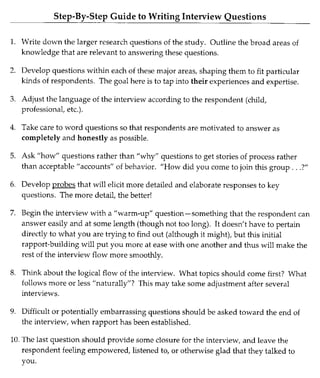Step by guide to writing interview questions
•
3 likes•16,198 views
This document provides a 10-step guide to writing effective interview questions: 1) outline research questions and relevant areas of knowledge; 2) develop questions within each area tailored to respondents; 3) adjust language for different respondents; 4) ask questions that motivate complete, honest answers; 5) ask "how" questions to elicit process stories; 6) develop follow-up probes for more detail; 7) begin with an easy warm-up question; 8) consider logical question flow; 9) ask difficult questions later; and 10) end on an empowering note.
Report
Share
Report
Share
Download to read offline

Recommended
Recommended
More Related Content
What's hot
What's hot (20)
Sdo navotas creative_writing_q2_m1_elements, techniques and literary devices ...

Sdo navotas creative_writing_q2_m1_elements, techniques and literary devices ...
Lesson 1 Academic Language used from Various Disciplines.pptx

Lesson 1 Academic Language used from Various Disciplines.pptx
Similar to Step by guide to writing interview questions
What is thinking & higher order thinking?
How to improve higher order thinking?
Why do we ask questions?
Principles of questioning
Strategies to use when student respond?
Strategies to use when student don’t respond
Strategies for responding to student questionsQuestioning techniques: The heart of Higher Order Thinking

Questioning techniques: The heart of Higher Order ThinkingSargodhains' Institute for Professional Development
Similar to Step by guide to writing interview questions (20)
Leadership series #1 The Art of Asking Questions and Listening Effectively

Leadership series #1 The Art of Asking Questions and Listening Effectively
Questioning techniques: The heart of Higher Order Thinking

Questioning techniques: The heart of Higher Order Thinking
Test Preparation and Test Taking Strategies DRES website edition.ppt

Test Preparation and Test Taking Strategies DRES website edition.ppt
Test Preparation and Test Taking Strategies DRES website edition.ppt

Test Preparation and Test Taking Strategies DRES website edition.ppt
More from bibliotecarioinvestigando
More from bibliotecarioinvestigando (12)
El estudio de casos en la investigación cualitativa

El estudio de casos en la investigación cualitativa
Step by guide to writing interview questions
- 1. Step-By-Step Guide to Writing Interview Questions 1. Write down the larger research questions of the study. Outline the broad areas of knowledge that are relevant to answering these questions. 2. Develop questions within each of these major areas, shaping them to fit particular kinds of respondents. The goal here is to tap into their experiences and expertise. 3. Adjust the language of the interview according to the respondent (child, professional, etc.). 4. Take care to word questions so that respondents are motivated to answer as completely and honestly as possible. 5. Ask "how" questions rather than "why" questions to get stories of process rather than acceptable "accounts" of behavior. "How did you come to join this group ...?" 6. Develop probes that will elicit more detailed and elaborate responses to key questions. The more detail, the better! 7. Begin the interview with a "warm-up" question-something that the respondent can answer easily and at some length (though not too long). It doesn't have to pertain directly to what you are trying to find out (although it might), but this initial rapport-building will put you more at ease with one another and thus will make the rest of the interview flow more smoothly. 8. Think about the logical flow of the interview. What topics should come first? What follows more or less "naturally"? This may take some adjustment after several interviews. 9. Difficult or potentially embarrassing questions should be asked toward the end of the interview, when rapport has been established. 10. The last question should provide some closure for the interview, and leave the respondent feeling empowered, listened to, or otherwise glad that they talked to you.